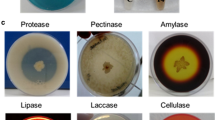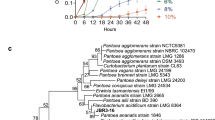Abstract
Our objective was to evaluate the role of plant growth-promoting bacteria to protect maize (Zea mays L.) plants against salt damage. Bacillus aquimaris DY-3 based on their 16S rDNA sequences, the most tolerant to salinity and the synthesis of indole acetic acid was selected for further studies. Strain was inoculated on maize roots growing in sterilized sand under salt stress conditions (1% NaCl). After one week, plant growth was promoted by bacterial inoculation regardless of salt stress and non-salt stress. Chlorophyll content, leaf relative water content, accumulation of proline, soluble sugar and total phenolic compound, and activities of superoxide dismutase, catalase, peroxidase and ascorbate peroxidase were enhanced, while lipid peroxidation levels and Na+ content were decreased. The results showed that B. aquimaris DY-3 alleviated the salt stress in maize, likely through the integration of the antioxidant enzymes and the non-antioxidant systems that improve the plant response. Hence, the application of indole acetic acid synthesizing plant growth-promoting bacteria may represent an important alternative approach to decrease the impact of salt stress on crops.
Similar content being viewed by others
Abbreviations
- APX:
-
ascorbate peroxidase
- CAT:
-
catalase
- Chl:
-
chlorophyll
- IAA:
-
indole acetic acid
- MDA:
-
malondialdehyde
- PGPB:
-
plant growth-promoting bacteria
- POD:
-
peroxidase
- ROS:
-
reactive oxygen species
- RWC:
-
relative water content
- SOD:
-
superoxide dismutase
References
Ramadoss, D., Lakkineni, V.K., Bose, P., Ali, S., and Annapurna, K., Mitigation of salt stress in wheat seedlings by halotolerant bacteria isolated from saline habitats, Springerplus, 2013, vol. 2, pp. 6.
Deinlein, U., Stephan, A.B., Horie, T., Luo, W., Xu, G., and Schroeder, J.I., Plant salt-tolerance mechanisms, Trends Plant Sci., 2014, vol. 19, pp. 371–379.
Paul, D. and Lade, H., Plant-growth-promoting rhizobacteria to improve crop growth in saline soils: a review, Agron. Sustain. Dev., 2014, vol. 34, pp. 737–752.
Rojas-Tapias, D., Pardo-Díaz, S., Obando, M., Rivera, D., and Bonilla, R., Effect of inoculation with plant growth-promoting bacteria (PGPB) on amelioration of saline stress in maize (Zea mays), Appl. Soil Ecol., 2012, vol. 61, pp. 264–272.
Fu, Q., Liu, C., Ding, N., Lin, Y., and Guo, B., Ameliorative effects of inoculation with the plant growthpromoting rhizobacterium Pseudomonas sp. DW1 on growth of eggplant (Solanum melongena L.) seedlings under salt stress, Agr. Water Manage., 2010, vol. 97, pp. 1994–2000.
Ali, S., Charles, T.C., and Glick, B.R., Amelioration of high salinity stress damage by plant growth-promoting bacterial endophytes that contain ACC deaminase, Plant Physiol. Biochem., 2014, vol. 80, pp. 160–167.
Esitken, A., Yildiz, H.E., Ercisli, S., Donmez, M.F., Turan, M., and Gunes, A., Effects of plant growth promoting bacteria (PGPB) on yield, growth and nutrient contents of organically grown strawberry, Sci. Hortic.- Amsterdam, 2010, vol. 124, no. 1, pp. 62–66.
Mohamed, H.I. and Gomaa, E.Z., Effect of plant growth promoting Bacillus subtilis and Pseudomonas fluorescens on growth and pigment composition of radish plants (Raphanus sativus) under NaCl stress, Photosynthetica, 2012, vol. 50, pp. 263–272.
Glickmann, E. and Dessaux, Y., A critical examination of the specificity of the Salkowski reagent for indolic compounds produced by phytopathogenic bacteria, Appl. Environ. Microbiol., 1995, vol. 61, no. 2, pp. 793–796.
Ghahfarokhi, M.G., Mansurifar, S., Taghizadeh-Mehrjardi, R., Saeidi, M., Jamshidi, A.M., and Ghasemi, E., Effects of drought stress and rewatering on antioxidant systems and relative water content in different growth stages of maize (Zea mays L.) hybrids, Arch. Agron. Soil Sci., 2015, vol. 61, pp. 493–506.
Karlidag, H., Yildirim, E., Turan, M., Pehluvan, M., and Donmez, F., Plant growth-promoting rhizobacteria mitigate deleterious effects of salt stress on strawberry plants (Fragaria × ananassa), Hortscience, 2013, vol. 48, pp. 563–567.
Zhu, X., Song, F., and Xu, H., Influence of arbuscular mycorrhiza on lipid peroxidation and antioxidant enzyme activity of maize plants under temperature stress, Mycorrhiza, 2010, vol. 20, pp. 325–332.
Chen, G.X. and Asada, K., Inactivation of ascorbate peroxidase by thiols requires hydrogen peroxide, Plant Cell Physiol., 1992, vol. 33, pp. 117–123.
Hayat, R., Ali, S., Amara, U., Khalid, R., and Ahmed, I., Soil beneficial bacteria and their role in plant growth promotion: a review, Ann. Microbiol., 2010, vol. 60, no. 4, pp. 579–598.
Jabborova, D., Egamberdieva, D., and Qodirova, D., Improvement of seedling establishment of soybean using IAA and IAA producing bacteria under saline conditions, J. Soil Water, 2013, vol. 2, pp. 531–538.
Yasar, F., Ellialtioglu, S., and Yildiz, K., Effect of salt stress on antioxidant defense systems, lipid peroxidation, and chlorophyll content in green bean, Russ J. Plant Physiol., 2008, vol. 55, pp. 782–786.
Tiwari, J.K., Munshi, A.D., Kumar, R., Pandey, R.N., Ajay, A., Bhat, J.S., and Sureja, A.K., Effect of salt stress on cucumber: Na+–K+ ratio, osmolyte concentration, phenols and chlorophyll content, Acta Physiol. Plant., 2009, vol. 32, pp. 103–114.
Golpayegani, A. and Tilebeni, H.G., Effect of biological fertilizers on biochemical and physiological parameters of basil (Ocimum basilicum L.) medicine plant, Am.–Eur. J. Agric. Environ. Sci., 2011, vol. 11, pp. 411–416.
Santos, C.V., Regulation of chlorophyll biosynthesis and degradation by salt stress in sunflower leaves, Sci. Hortic.-Amsterdam, 2004, vol. 103, pp. 93–99.
Jha, Y. and Subramanian, R.B.S., Paddy physiology and enzymes level is regulated by rhizobacteria under saline stress, J. Appl. Bot. Food Qual., 2012, vol. 85, pp. 168–173.
Lugojan, C. and Ciulca, S., Evaluation of relative water content in winter wheat, J. Hortic. For. Biotechnol., 2011, vol. 15, pp. 173–177.
Parida, A.K. and Das, A.B., Salt tolerance and salinity effects on plants: a review, Ecotox. Environ. Safe., 2005, vol. 60, no. 3, pp. 324–329.
Bohnert, H.J. and Sheveleva, E., Plant stress adaptations- making metabolism move, Curr. Opin. Plant Biol., 1998, vol. 1, pp. 267–274.
Gandonou, C.B., Bada, F., Abrini, J., and Skali-Senhaji, N., Free proline, soluble sugars and soluble proteins concentration as affected by salt stress in two sugarcane (Saccharum sp.) cultivars differing in their salt tolerance, Int. J. Biol. Chem. Sci., 2011, vol. 5, pp. 2441–2453.
Verbruggen, N. and Hermans, C., Proline accumulation in plants: a review, Amino Acids, 2008, vol. 35, pp. 753–759.
Kubikova, E., Jennifer, L.M., Bonnie, H.O., Michael, D.M., and Augé, M.R., Mycorrhizal impact on osmotic adjustment in Ocimum basilicum L. during a lethal drying episode, J. Plant Physiol., 2001, vol. 158, pp. 1227–1230.
Feng, G., Zhang, F., Li, X., Tian, C.Y., Tang, C., and Rengel, Z., Improved tolerance of maize plants to salt stress by arbuscular mycorrhiza is related to higher accumulation of soluble sugars in roots, Mycorrhiza, 2002, vol. 12, pp. 185–190.
Xia, L.J., Yang, L.Q., Sun, N.L., Li, J., Fang, Y.J., and Wang, Y.P., Physiological and antioxidant enzyme gene expression analysis reveals the improved tolerance to drought stress of the somatic hybrid offspring of Brassica napus and Sinapis alba at vegetative stage, Acta Physiol. Plant., 2016, vol. 38, pp. 1–10.
Upadhyay, S.K., Singh, J.S., Saxena, A.K., and Singh, D.P., Impact of PGPR inoculation on growth and antioxidant status of wheat under saline conditions, Plant Biol., 2011, vol. 14, pp. 605–611.
Tattini, M., Remorini, D., Pinelli, P., Agati, G., Saracini, E., Traversi, M.L., and Massai, R., Morphoanatomical, physiological and biochemical adjustments in response to root zone salinity stress and high solar radiation in two Mediterranean evergreen shrubs, Myrtus communis and Pistacia lentiscus, New Phytol., 2006, vol. 170, pp. 779–794.
Author information
Authors and Affiliations
Corresponding author
Additional information
The article is published in the original.
Rights and permissions
About this article
Cite this article
Li, H.Q., Jiang, X.W. Inoculation with plant growth-promoting bacteria (PGPB) improves salt tolerance of maize seedling. Russ J Plant Physiol 64, 235–241 (2017). https://doi.org/10.1134/S1021443717020078
Received:
Published:
Issue Date:
DOI: https://doi.org/10.1134/S1021443717020078




